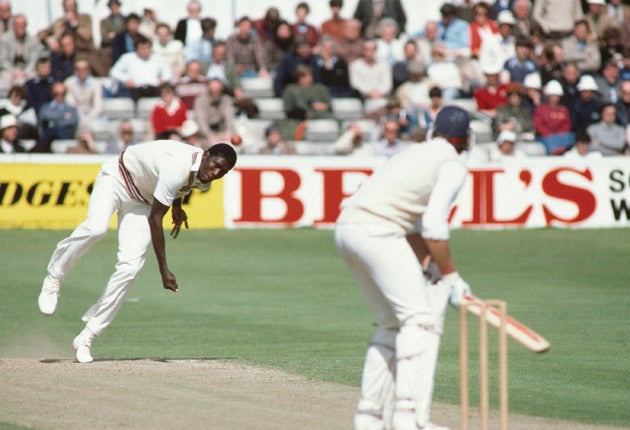When the Windies hit the world for six
A new film recalls the glory days of West Indian cricket. Geoffrey Macnab is bowled over by a remarkable sporting story.

Your support helps us to tell the story
From reproductive rights to climate change to Big Tech, The Independent is on the ground when the story is developing. Whether it's investigating the financials of Elon Musk's pro-Trump PAC or producing our latest documentary, 'The A Word', which shines a light on the American women fighting for reproductive rights, we know how important it is to parse out the facts from the messaging.
At such a critical moment in US history, we need reporters on the ground. Your donation allows us to keep sending journalists to speak to both sides of the story.
The Independent is trusted by Americans across the entire political spectrum. And unlike many other quality news outlets, we choose not to lock Americans out of our reporting and analysis with paywalls. We believe quality journalism should be available to everyone, paid for by those who can afford it.
Your support makes all the difference.The best sports documentaries invariably transcend their subject matter. Leon Gast's When We Were Kings (1996) and John Dower's Thriller in Manila (2008) aren't just about two of Muhammad Ali's best known fights.
They're stories about race, politics, commerce, endurance, bitterness and the human capacity for both grace and violence.
By the same token, Fire in Babylon, premiering in the London Film Festival tonight, is much more than a cricket film. Stevan Riley's remarkable documentary tells the story of the all-conquering West Indies cricket team of the 1970s and early 1980s. This was the team of Clive Lloyd and Viv Richards – and also of several of the most lethal fast bowlers of the modern cricket era. The documentary gives the lie to the idea that there have never been any decent films about cricket. You don't need to know anything about the game to appreciate what Riley is telling us about West Indian national pride and English colonial bad faith.
The narrative trajectory is straightforward enough. The West Indies team used to be dismissed as "calypso cricketers". They had players of great talent but did not win consistently. In 1975/76, they were humiliated 5-1 in a Test series against an Australian side containing the ferocious fast bowlers Jeff Thompson and Dennis Lillee. Their attitude, in the wake of this defeat, was "never again". The West Indies players were part of a generation determined to prove themselves against their former colonial masters. This was the era of Black Power and African liberation. When the English captain of the era, Tony Greig, infamously boasted in 1976 that he would make the West Indies "grovel," they made him eat his words.
There is comedy, pathos and violence in the imagery of English batsmen like Greig and the stubborn, bald-headed, 45-year-old Yorkshireman Brian Close facing up to the fast-bowling attack led by Michael Holding, Joel Garner and Andy Roberts. It is cinematic too. Certain archive scenes here play like sequences from a Mack Sennett comedy. All seems calm during the long, elegant run-up of Holding and then, a moment after the ball is released, an Englishman is down – poleaxed by one of Holding's bouncers. At one point, when Viv Richards is batting and you see him on the big screen hammer a ball, he hits it so hard that the instinct is to duck.
The English cried foul and complained that the West Indies fast-ball bombardment was against the spirit of the game. Riley acknowledges that the bowling attack did put "between 50 and 60 people" in hospital over the years, but insists that Holding and co were simply playing to the rules of the game... just as Lillee and Thomson and English 1930s fast bowler Harold Larwood had done.
Riley realised the key to the success of Fire In Babylon was winning over Clive Lloyd and Viv Richards at the outset. "They're the guys the rest of the team take their cue from, even today." Once they were aboard, Holding, Colin Croft, Gordon Greenidge... and reggae star Bunny Wailer followed. Viv Richards was friendly with Bob Marley, himself a keen cricket fan who could "bowl every ball".
Cricket in the West Indies today has nothing like the hold on the popular imagination that it did in the 1970s. As Riley notes, the game is no longer part of the zeitgeist in the way it was during the Viv Richards era. "This film is about a very specific generation – the generation that overlapped the era of independence. Suddenly, you had this group of youngsters who want to make a firm statement that they'd broken with their colonial past and wanted to put the West Indies on the map. This surge of ambition was, in many ways, peculiar to that generation."
Fire in Babylon is a tribute to one of the best international cricket teams in recent memory but the sport is just the starting point – and that's why the film makes such rich and rewarding viewing.

Watch Apple TV+ free for 7 days
New subscribers only. £8.99/mo. after free trial. Plan auto-renews until cancelled

Watch Apple TV+ free for 7 days
New subscribers only. £8.99/mo. after free trial. Plan auto-renews until cancelled
'Fire in Babylon' premieres at the London Film Festival ( www.bfi.org.uk/lff) tonight and screens on Thursday
Join our commenting forum
Join thought-provoking conversations, follow other Independent readers and see their replies
Comments